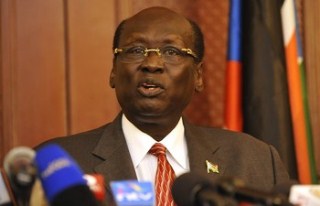S. Sudan condemns Raja attack, sends complaint to UNSC
January 3, 2012 (JUBA) – South Sudan has strongly condemned an attack which it says Sudan’s military carried out on its territory on Wednesday, calling for the immediate intervention of the United Nations Security Council (UNSC).

Despite the attack, South Sudan’s president Salva Kiir will still attend a meeting with his Sudanese counterpart Omar al-Bashir in Addis Ababa on Friday, Marial said. Diplomats are pessimistic that the summit will be able to resolve the many issues causing tension between the two nations, including oil, border disputes, security, and citizenship.
The South Sudan army (SPLA) was able to repulse a ground attack launched by the Sudanese forces, the minster said, adding that it was the aerial bombardment which injured innocent civilians in the area.
“We are still waiting for the details on the casualties among the civilian population in the area. [But] on behalf of the Government of South Sudan, we strongly condemn this unprovoked and unwanted attack on the innocent civilians in that area,” Marial said at the press conference in Juba.
Although the SPLA has not given official figures, multiple military anonymous sources in the area told Sudan Tribune on Wednesday, that at least 32 civilians and soldiers died and many more sustained injuries.
The southern army were conducting a parade when SAF attacked their military base, the sources said.
Marial said South Sudan will petition the UNSC over Sudan’s “continuous” aerial bombardment of its territory, in defiance of international laws.
“We are also urging the United Nations that it is part of their responsibility according to the Chapter Seven agreement that they are here to protect the civilians,” he said.
The South Sudanese military said that Wednesday’s attack followed a clash with the Sudanese Armed Forces – aided by Sudanese paramilitary the Popular Defense Forces (PDF) and armed tribesmen on horseback – on Saturday 29 December in the Sirmalaka area of Western Bahr el Ghazal’s Raja County.
South Sudan has also claimed that at least five people were killed by SAF air and ground attacks on a contested border area between Northern Bahr el Ghazal and Sudan’s western Darfur region on 26 December.
The Sudanese army has denied attacking the Kiir Adem area of Mile 14, but admitted that clashes occurred between the SPLA and Al-Rizigat tribesmen in the disputed region.
Khartoum routinely denies bombing southern territory often blaming tribal clashes or saying that it only attacks rebels moving across the border into Sudan from South Sudan. Juba, also denies hosting or aiding Sudanese rebels and, conversely, accuses Sudan of supporting rebels in its territory.
Wednesday’s reported attacks came two days before a scheduled meeting between Sudanese President, Omer Hassan al-Bashir and his South Sudanese counterpart, Salva Kiir in Ethiopian capital, Addis Ababa.
Marial, at the briefing, said the 4 January summit between the two presidents would still proceed as planned.
“The meeting of our President Salva Kiir Mayardit and President Omer al-Bashir will go ahead on the 4th of January 2013 and their main topics of discussion will be simply the implementation of the agreements that has been signed,” he stressed.
South Sudan, he added, has already dispatched its chief negotiator, Pagan Amum, to the Ethiopian capital, in order to prepare the ground for discussions on the implementation of the Cooperation Agreement, which was signed in September with mediation by the African Union High-Level Implementation Panel (AUHIP).
The deal, signed under the threat of sanctions from the United Nations Security Council (UNSC), did not, however, address the status of contested areas such as Abyei and Kafia Kingi.
In his New Year’s Eve message, President Kiir said he was ordering South Sudan’s army to pull back from the tense border as a sign of good will to implement the security elements of the deal reached in Addis Ababa on 27 September, which included the demilitarization of their common border.
Both countries, agreed to withdraw their troops 10 kilometers from either side of the border, and for the buffer zone to be monitored by the United Nations peacekeeping forces (UNISFA) working in Abyei and a joint force from the northern and southern armies.
However, the security arrangements of the deal have not yet been implemented, with Khartoum demanding that South Sudan disarms its former comrades who have been fighting the government in South Kordofan and Blue Nile since 2011, as a precondition for the full implementation of the other aspects of the deal.
Khartoum also demanded that the buffer zone be extended to include South Sudan’s border with the Sudanese states of Blue Nile and South Kordofan in order to prevent the SPLM-N rebels operating in the two states using South Sudan as a base.
President Kiir, has previously said Sudan’s demands “will not happen”, describing them as practically “impossible”.
“They want to take the contested areas so that [Bashir] talks with [a] position of strength when we meet. They will not manage. Their ground attacks have been repulsed. [The] SPLA is capable of defending this country”, Kiir told members of his government on Wednesday.
(ST)
ST – Sudanese army carry out fresh attacks on Raja, 32 killed, SPLA claim
